八年级英语下册第二单元知识点
人教版八年级英语下册第二单元知识点汇总
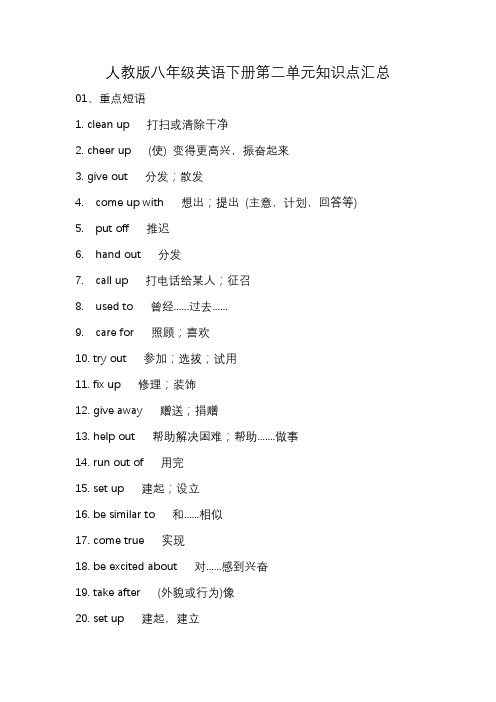
人教版八年级英语下册第二单元知识点汇总01、重点短语1. clean up 打扫或清除干净2. cheer up (使) 变得更高兴,振奋起来3. give out 分发;散发4. come up with 想出;提出(主意,计划,回答等)5. put off 推迟6. hand out 分发7. call up 打电话给某人;征召8. used to 曾经......过去......9. care for 照顾;喜欢10. try out 参加;选拔;试用11. fix up 修理;装饰12. give away 赠送;捐赠13. help out 帮助解决困难;帮助.......做事14. run out of 用完15. set up 建起;设立16. be similar to 和......相似17. come true 实现18. be excited about 对......感到兴奋19. take after (外貌或行为)像20. set up 建起,建立21. make a difference 影响;有作用02、重点句子Grammar Focus 句子I’d like to help homeless people.我想帮助无家可归的人。
She decided to try out for a volunteer after-school reading program. 她决定参加一个课外阅读项目的志愿者选拔。
You could ask hospitals to let you visit the kids and cheer them up. 你可以请求医院让你看望那些孩子,并让他们高兴起来。
Mario believes it can help him to get his future dream job.马里奥相信这能帮助他找到将来梦寐以求的工作。
She volunteers there once a week to help kids to read.她每周去那儿做一次义工,帮助孩子们学习阅读。
八年级下册英语第二单元知识点

八年级下册英语第二单元知识点八年级下册英语第二单元知识点详解1. 词汇•champion: 冠军•talented: 有才能的•athlete: 运动员•coach: 教练•challenge: 挑战•competition: 竞赛•teamwork: 团队合作•strategy: 战略•skill: 技巧•determination: 决心•inspire: 激励2. 语法直接引语和间接引语直接引语是将别人的话原封不动地引述出来,使用双引号括起来。
例如:He said, “I like playing basketball.”间接引语是将别人的话转述出来,使用陈述句的语序。
例如:He said that he liked playing basketball.状语从句状语从句是用来修饰主句中的动词、形容词或副词的从句。
常见的状语从句有时间状语从句、地点状语从句、原因状语从句、结果状语从句等。
例如:He is studying hard so that he can pass the exam.动词的时态和语态八年级下册英语第二单元主要涉及以下时态和语态:•一般现在时•现在进行时•一般过去时•现在完成时3. 阅读理解八年级下册英语第二单元的阅读理解主要包括根据短文内容回答问题、判断正误、填空等题型。
在解答这些题目时,可以根据短文中的关键词理解和推断答案。
4. 写作技巧八年级下册英语第二单元的写作部分要求学生写一篇有关发表英语演讲的稿件。
在写作过程中,可以按照以下步骤进行:1.确定演讲主题,如“My Favorite Sport”。
2.分段写作,首先介绍自己对运动的喜爱,然后介绍自己喜欢的运动项目以及参加该项目的原因和经历。
3.使用恰当的词汇和句型,如使用形容词来描述运动项目,使用时间状语从句来表达参加该项目的时间等。
4.结尾部分可以总结自己对运动的看法或展望未来。
5. 学习技巧八年级下册英语第二单元的学习技巧部分主要包括听力技巧和阅读技巧。
八下英语第二单元重点
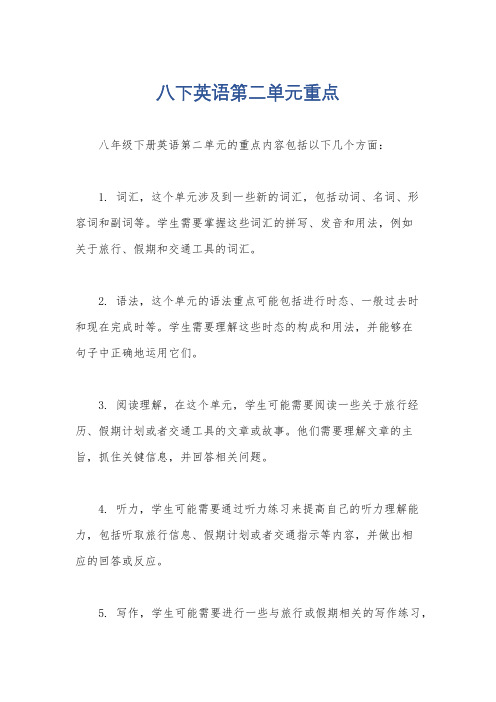
八下英语第二单元重点
八年级下册英语第二单元的重点内容包括以下几个方面:
1. 词汇,这个单元涉及到一些新的词汇,包括动词、名词、形
容词和副词等。
学生需要掌握这些词汇的拼写、发音和用法,例如
关于旅行、假期和交通工具的词汇。
2. 语法,这个单元的语法重点可能包括进行时态、一般过去时
和现在完成时等。
学生需要理解这些时态的构成和用法,并能够在
句子中正确地运用它们。
3. 阅读理解,在这个单元,学生可能需要阅读一些关于旅行经历、假期计划或者交通工具的文章或故事。
他们需要理解文章的主旨,抓住关键信息,并回答相关问题。
4. 听力,学生可能需要通过听力练习来提高自己的听力理解能力,包括听取旅行信息、假期计划或者交通指示等内容,并做出相
应的回答或反应。
5. 写作,学生可能需要进行一些与旅行或假期相关的写作练习,
比如写一篇关于自己假期计划的短文或者写一封给朋友的电子邮件,分享旅行经历。
总的来说,这个单元的重点是让学生掌握与旅行、假期和交通
工具相关的词汇、语法和表达能力,培养他们的阅读理解和听力理
解能力,同时提高他们的写作能力。
希望这些内容能够帮助你更好
地理解这个单元的重点。
八年级下册2单元笔记英语

八年级下册2单元笔记英语Unit 2 What's the matter?重点词汇:1. matter:事情,问题2. stomachache:胃痛3. toothache:牙痛4. fever:发烧5. headache:头痛6. backache:背痛7. earache:耳痛8. footache:脚痛9. neckache:脖子痛10. armache:胳膊痛11. cold:感冒12. have a cold/have a cough/have a sore throat:感冒/咳嗽/喉咙痛13. lie down:躺下14. rest:休息15. drink some water:喝些水16. take medicine:吃药17. see a doctor:看医生18. go to bed early:早睡19. eat healthy food:吃健康的食物20. exercise:锻炼重点句型:1. What's the matter?:怎么了?2. I have a … 我有一个……(如toothache、fever等)3. I have a … and … 我有一个……和……(如 a toothache and a headache等)4. I have a …,a … and a … 我有一个……,一个……和一个……(如a stomachache, a cold and a sore throat等)5. I feel … 我感觉到……(如tired, hot等)6. I need to … 我需要……(如lie down, rest等)7. You should … 你应该……(如drink some water, take medicine等)8. You should go to bed early. 你应该早睡。
9. You should eat healthy food. 你应该吃健康的食物。
人教部编版八年级英语下册第二单元笔记重点汇总(可直接打印)
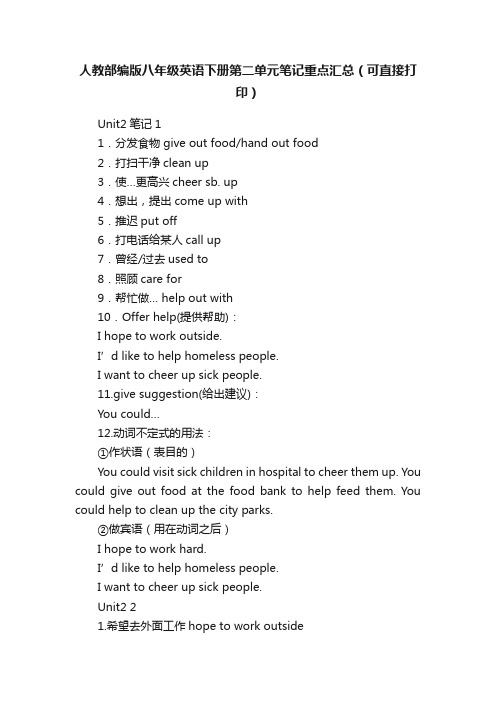
人教部编版八年级英语下册第二单元笔记重点汇总(可直接打印)Unit2笔记11.分发食物give out food/hand out food2.打扫干净clean up3.使…更高兴cheer sb. up4.想出,提出come up with5.推迟put off6.打电话给某人call up7.曾经/过去used to8.照顾care for9.帮忙做… help out with10.Offer help(提供帮助):I hope to work outside.I’d like to help homeless people.I want to cheer up sick people.11.give suggestion(给出建议):You could…12.动词不定式的用法:①作状语(表目的)You could visit sick children in hospital to cheer them up. You could give out food at the food bank to help feed them. You could help to clean up the city parks.②做宾语(用在动词之后)I hope to work hard.I’d like to help homeless people.I want to cheer up sick people.Unit2 21.希望去外面工作hope to work outside2.帮助摆脱饥饿help stop hunger(名词)3.食物赈济处food bank4.课后学习活动an after-school study program5.想出/提出一个计划come up with a plan6.推迟制定计划put off making a plan7.张贴标语put up signs8.写一些公告make some notices9.需要做某事need to do …10.在敬老院in an old people’s home11.让某人做某事ask sb. to do …12.帮助解决某事help out with sth.13.给我讲过去的故事tell me stories about past14.是孤独的/感觉孤独be lonely / feel lonely15.听/倾听listen to16.照顾他们care for themSection A 3a 笔记1.students who volunteer 做志愿服务的学生2.give up several hours to do sth.花费几个小时去做某事(动词不定式表目的)spend several hours doing sth. 花费几个小时做某事3.give up doing sth. 放弃做某事4.get such a strong feeling of satisfaction/joy 产生如此强烈的满足感/喜悦感get a feeling of happiness / joy / being helpful / satisfaction 产生幸福/快乐/助人/满足感5.the look of joy 快乐的表情6.on their owners’ faces 在他们主人们的脸上7.at the age of 4 在四岁的时候8.try out for…参加…的选拔9.go on a different journey 进行一次不一样的旅行10.a dream come true 梦想成真… is a dream come true for me.↓(名词/动名词)例:Volunteering here is a dream come true for me.Going on vacation in Yunnan is a dream come true for me.11.at the same time 同时Grammar Focus动词不定式的用法:(必须掌握三种基本用法)一、动词不定式作宾语:(用于动词之后)①want to do sth.②hope to do sth.③try/decide等等之后跟to do sth.二、作宾补(用于宾语之后)①would like sb. to do sth.②tell sb. to do sth.③ask / want / allow等等三、作状语1.We make some signs to put up around the school. (表目的)2.be+adj.(表示心情)+to do(作原因状语)I am sorry to trouble you. 补充其他用法:四、作主语:To be an engineer is my dream.五、作表语(用在be动词之后)His aim is to win the first prize.六、作定语:I’d like something to drink.(喝的东西)七、特殊疑问词+to do sthI don’t know how to plant a tree.Section B (1a-1e) 笔记1、take after=be similar to 与……像,相似(外貌、行为方面)look after 看起来像(多指外貌)2、修理:fix up fix it up (代词放中间)修理:repair修补:mend3、give away sth. to sb. 把某物赠送给某人give away 赠送,泄露give up 放弃give in (to) 屈服,投降give out 分发,用完耗尽4、broken bicycle parts 损坏的自行车部分My bike is broken. 我的自行车坏了。
八年级下英语第二单元知识点
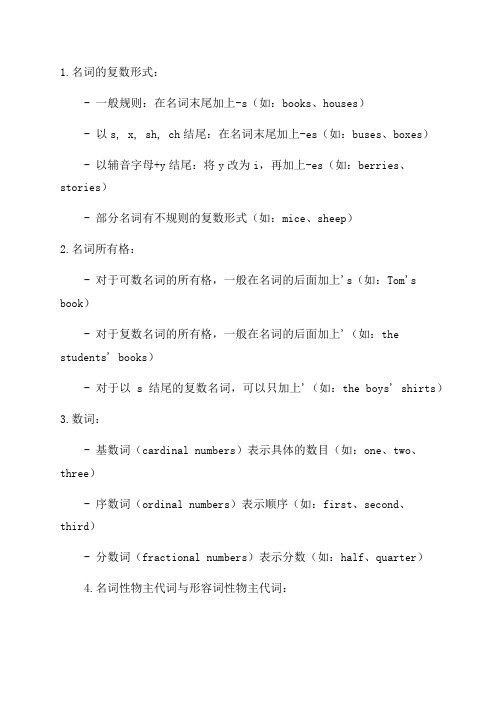
1.名词的复数形式:- 一般规则:在名词末尾加上-s(如:books、houses)- 以s, x, sh, ch结尾:在名词末尾加上-es(如:buses、boxes)- 以辅音字母+y结尾:将y改为i,再加上-es(如:berries、stories)- 部分名词有不规则的复数形式(如:mice、sheep)2.名词所有格:- 对于可数名词的所有格,一般在名词的后面加上's(如:Tom's book)- 对于复数名词的所有格,一般在名词的后面加上'(如:the students' books)- 对于以s结尾的复数名词,可以只加上'(如:the boys' shirts)3.数词:- 基数词(cardinal numbers)表示具体的数目(如:one、two、three)- 序数词(ordinal numbers)表示顺序(如:first、second、third)- 分数词(fractional numbers)表示分数(如:half、quarter)4.名词性物主代词与形容词性物主代词:- 名词性物主代词(possessive pronouns)用来替代名词,并表示所有关系(如:mine、yours、his)- 形容词性物主代词(possessive adjectives)用来修饰名词,并表示所有关系(如:my、your、his)5.数词的计量单位:- 时间单位:hour、minute、second- 重量单位:gram、kilogram6.物品价格的表示方法:- 表示完整价格的句子结构:it costs + 价格(如:It costs five dollars.)- 表示价格范围的句子结构:from + 较低的价格 + to + 较高的价格(如:The price ranges from ten to twenty dollars.)7.数词的用法:- 表示年龄(如:She is fifteen years old.)- 表示日期(如:Today is the fifteenth of June.)- 表示顺序(如:He came in second place.)8.动词:- 动词的现在进行时表示正在进行的动作(如:She is eating dinner.)- 动词的过去式表示过去发生的动作(如:He went to school yesterday.)- 动词的过去分词(如:played、eaten)用来构成完成时态和被动语态。
人教版八年级英语下册第二单元复习知识语法点
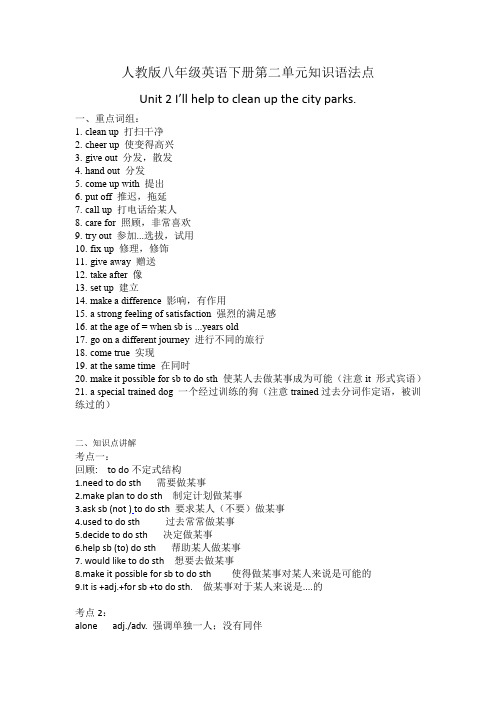
人教版八年级英语下册第二单元知识语法点Unit 2 I’ll help to clean up the city parks.一、重点词组:1.clean up 打扫干净2.cheer up 使变得高兴3.give out 分发,散发4.hand out 分发e up with 提出6.put off 推迟,拖延7.call up 打电话给某人8.care for 照顾,非常喜欢9.try out 参加...选拔,试用10.fix up 修理,修饰11.give away 赠送12.take after 像13.set up 建立14.make a difference 影响,有作用15.a strong feeling of satisfaction 强烈的满足感16.at the age of = when sb is ...years old17.go on a different journey 进行不同的旅行e true 实现19.at the same time 在同时20.make it possible for sb to do sth 使某人去做某事成为可能(注意it 形式宾语)21.a special trained dog 一个经过训练的狗(注意trained过去分词作定语,被训练过的)二、知识点讲解考点一:回顾: to do不定式结构1.need to do sth 需要做某事2.make plan to do sth 制定计划做某事3.ask sb (not )to do sth 要求某人(不要)做某事ed to do sth 过去常常做某事5.decide to do sth 决定做某事6.help sb (to) do sth 帮助某人做某事7. would like to do sth 想要去做某事8.make it possible for sb to do sth 使得做某事对某人来说是可能的9.It is +adj.+for sb +to do sth. 做某事对于某人来说是....的考点2:alone adj./adv. 强调单独一人;没有同伴lonely adj. 孤独的;寂寞的带有强烈的感情色彩feel lonely 感到孤独考点3:run of “被用完;被耗尽”, 主语通常是时间、金钱、食物等无生命的名词Eg. Her money has already run out. 她的钱已经被用完了run out of :用完主语只能是人She has already run out of money. 她已经花光了钱run--ran--run (原形--过去式--过去分词)考点4:---ing/---ed 形容词的考点:---ing修饰物;---ed修饰人boring adj.无聊的bored adj. 感到无聊的① exciting adj.令人兴奋的excited adj. 感到兴奋的be excited about 因...而兴奋② satisfied adj.满意的;满足的近义词:pleasedv. satisfy v.使满意;使满足n. satisfaction 满意;满足be satisfied with sth = be pleased with 对...满意考点5:advice n.建议;劝告不可数名词没有单复数一条建议:a piece of advice 一些建议:some adviceask for advice 征求建议听从某人的建议:take/ follow one’s advice近义词:suggestion n.建议(可数名词)v. advise /ədˈvaɪz/advise sb to do sth 建议某人做某事advise sb not to do sth 建议某人不要去做某事考点6:--ness名词后缀happy adj. ---happiness n. 幸福;快乐sad adj. --- sadness n.悲伤kind adj. ---kindness 仁慈;好意考点7:volunteer /ˌvɒlənˈtɪə(r)/ v.义务做;自愿做n.志愿者复数:volunteers volunteer to do sth 自愿做某事考点8:fight /faɪt/ v.打仗;打架fighter n. 战士have /take a fight with sb 和某人打架;打仗fight against 与....抗争例1: I don’t want to have a fight_______my cousin.A.withB.forC.atD.to考点9:动词+offput off 推迟take off 脱掉;起飞get off 下车show off 炫耀cut off 切除;切断give off 分发;散发turn off 关闭set off 出发考点10use的用法ed to do sth. 过去常常做某事例句:I didn’t use to go skating,but now I do it very often.我过去不经常去滑冰,但我现在经常去。
八下英语二单元知识点

八下英语二单元知识点八年级下册英语第二单元主要围绕着“日常活动”这一主题展开,涉及了学生们在学校和家中进行的各种活动,包括学习、运动、娱乐等。
以下是本单元的重点知识点详解,帮助同学们更好地掌握和运用所学知识。
一、重点词汇日常活动类词汇:study(学习)、play(玩耍)、eat(吃)、sleep(睡觉)、wash(洗漱)、shop (购物)等。
学校生活相关词汇:class(课程)、homework(作业)、test(考试)、library(图书馆)、playground (操场)等。
运动类词汇:swim(游泳)、play tennis(打网球)、ride a bike(骑自行车)、climb mountains (爬山)等。
频度副词:always(总是)、usually(通常)、often(经常)、sometimes(有时)、never(从不)等。
二、重点短语日常活动短语:go to the movies(去看电影)、go shopping(去购物)、play computer games (玩电脑游戏)、do housework(做家务)等。
学校生活短语:have a test(参加考试)、go to the library(去图书馆)、play sports(做运动)、after-school activities(课后活动)等。
运动类短语:play tennis with sb.(和某人一起打网球)、go swimming(去游泳)、ride a bike to school(骑自行车上学)等。
三、重点句型询问某人通常做什么活动的句型:What do you usually do on weekends? 你周末通常做什么?描述某人一周内活动安排的句型:On Monday, I usually ... 周一我通常……;On the weekend, I sometimes ... 周末我有时……使用频度副词谈论日常活动的句型:I always get up at 6:30 in the morning. 我总是早上6:30起床。
英语八年级下册第二单元语法知识
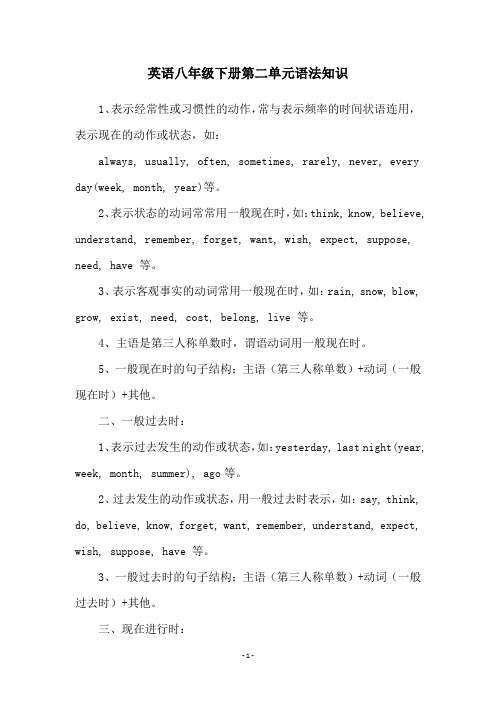
英语八年级下册第二单元语法知识1、表示经常性或习惯性的动作,常与表示频率的时间状语连用,表示现在的动作或状态,如:always, usually, often, sometimes, rarely, never, every day(week, month, year)等。
2、表示状态的动词常常用一般现在时,如:think, know, believe, understand, remember, forget, want, wish, expect, suppose, need, have 等。
3、表示客观事实的动词常用一般现在时,如:rain, snow, blow, grow, exist, need, cost, belong, live 等。
4、主语是第三人称单数时,谓语动词用一般现在时。
5、一般现在时的句子结构:主语(第三人称单数)+动词(一般现在时)+其他。
二、一般过去时:1、表示过去发生的动作或状态,如:yesterday, last night(year, week, month, summer), ago等。
2、过去发生的动作或状态,用一般过去时表示,如:say, think, do, believe, know, forget, want, remember, understand, expect, wish, suppose, have 等。
3、一般过去时的句子结构:主语(第三人称单数)+动词(一般过去时)+其他。
三、现在进行时:1、表示当前正在进行或发生的动作,如:now, at present, at the moment, still, look 等。
2、表示经常性的动作或一段持续的动作时,常用现在进行时,如:work, play, read, run, swim, stay 等。
3、现在进行时的句子结构:主语(第三人称单数)+ be 动词(am, is, are)+ 动词(现在分词)+ 其他。
初二下册英语第二单元知识点归纳

U n i t2W h a t s h o u l d I d o 单元目标目标句型:1. What should I do2. Why don’t you…3. You could …4. You should…5. You shouldn’t…语法:情态动词的用法Ⅰ重难点分析情态动词Modal Verbs Ⅰ情态动词和其他动词连用,可表示说话人的语气;情态动词可表达建议、要求、可能和意愿等; 情态动词没有人称和数的变化;常用的情态动词有:can, could, may, might, must, shall, should, will, would这九大情态动词;其他的还有ought to, need, dare 等;一、九大情态动词的时态关系:1. 现在式 can -- 过去式 could2. 现在式 may -- 过去式 might3. 现在式 shall -- 过去式 should4. 现在式 will -- 过去式 would5. 现在式 must -- 过去式 must 常用had to来代替二、情态动词表示“可能”或“预测”can, could, will, would, shall, should, must, ought to1can 和 could 用于表示“可能”或“预测”:1. He can't be at home. 否定句他不可能在家;2. Can the news be true 将情态动词 can 置于主语 the news 前就成疑问句这消息可能是真的吗3. Anybody can make mistake. 只表示理论上的可能性任何人都可能犯错误;2may 和 might 用于表示“事实上的可能性”或“预测”:1. It may rain tomorrow. 表示可能会发生明天可能会下雨;2. It may snow later this afternoon. 表示预测今天下午可能会下雪;3. You might be right. 表示有可能你可能是对的;3will 和 would 用于表示“预测”或“习惯性”:1. I think he will be all right now. will be 表示一定会我想他现在一定好了;2. That would be his mother.would be 表示肯定是那肯定是他母亲;3. He will sit there hour after hour looking at the river.will 表示经常的他经常一连几个小时坐在那儿看着河水;4shall 和 should 用于表示“必定”:1. I shall be rich one day. shall be 总有一天我会发达的;2. That should be Sam and his mother. should be 那准是Sam 和他的母亲;5must 用于表示“必定”,“必会”:1. This must be good for you.must be 肯定这肯定对你是有益的;2. All mankind must die.表示必然会发生的事所有的人一定会死的;3. Mustn't there be a mistake mustn't 多用于疑问句那肯定会有错误吗三、情态动词表示“许可”、“请求”can, could, will, would, shall, should, may, might, must1can 和 could 用于表示“许可”、“请求”:1. Can I go with you 请求我能跟你一起走吗2. Father said I could go to cinema. 表示过去的许可爸爸说我可以去看电影;3. Could I ask you something 请求,用 could 比 can 更婉转我可以问你一件事吗2will 和 would 用于表示“请求”1. Will you kindly tell me the way to the post office 表示客气请求请问到邮局怎么走2. Would you give me your address 用 would 比 will 表示更客气请你告诉我你的地址,好吗3shall 和 should 用于第一人称,表示征求对方的意见1. Shall we talk 我们谈谈好吗2. What should we do next 用should 比 shall 表示更客气下一步我们该怎么做3. Shall he come to see you 用于第三人称疑问句要不要他来看你4may 和 might 用于表示“许可”口语中多用 can1. You may take a walk. 表示给予许可你可以散散步;2. You might read the story for me. 比may更婉转是否请给我读一读这故事;I make a suggestion 我可以提个建议吗4. Might I take a look of your work 我看看您的大作行吗5. Students may not make noise in the library. may not 表示不许可或禁止学生不得在图书馆里吵闹;6. If I may say so, you are not right. 用于条件句,表示请求你是不对的,如果我可以这么说的话;5must 用于表示“禁止”,“不准”:1. Cars must not be parked here. must not表示不许可此地不准停车;2. All of you mustn't fishing in the pool. must not 语气方面比 may not 更强你们不准在池里钓鱼;四、重要短语和表达法Key Words1.argue v.争论;争吵 argue with sb.与某人吵架I argued with my best friend.我和我的好朋友吵架了;2.① either adv.用于否定句也He doesn’t have any money, and I don’t, either.他没有钱,我也没有;② too 也用于肯定或疑问句I’m a teacher.He is a teacher, too.我是老师,他也是老师;We are going hiking. Are they going hiking,too我们要去徒步旅行,他们也要去吗3.ask sb.for sth.向某人寻求某物;要……Don't ask for food every day.Go and find some work.别天天要饭,找点儿工作做; 4.the same as... 与……相同The clothes are the same as my friends'.这些衣服与我朋友的一样;5.except 除……以外;不包括……在内My class has been invited except me.= Only I haven't been invited.除我以外,我的同学都被邀请了;besides 除……以外包括在内We all went there besides him.= He went there.We went there, too.包括他在内,我们都去了;6.wrong adj.错误的;有毛病的;不合适的─ What's wrong with you 你怎么了你哪里不舒服Wh at’s wrong with your watch It doesn't work.你的手表怎么了它不走了;adv.错误地;不正确地;不对地He answered wrong.他答错了;7.get on well with sb.与某人相处融洽We get on well with each other.我们彼此相处融洽;8.have a fight with sb.= fight with sb.与某人打架I don‘t want to have a fight with m y cousin.我不想和我的堂兄打架;五、主要句型Key Sentences StructuresWhat should I do You could write him a letter.What should he do Maybe he should say sorry to himWhat should they do They shouldn't argue.六、词语辨析1. borrow sth. from sb.从某人处借进某物lend sth. to sb.= lend sb. sth. 把某物借给某人2. ①get sb. to do…使……做以人为对象时,有“说服……使做……”的含义You’ll never get her to agree. 你决不可能使她同意;②ask sb. to do…邀请人做……We asked her to come to our party.我们请她来参加聚会③tell sb. to do…让某人做某事The teacher told him to finish the work that day. 老师那天让他完成那项工作;3、be in style时髦的,流行的be out of style 过时的,不时髦的七、课文解释1、I don’t want to surprise him. 我不想让他感到意外;此处surprise是及物动词 surprise sb. 使某人感到吃惊eg. My friend always surprises me.2、talk about it on the phone 用电话就此事进行交流eg. Call Jim on the phone.找吉姆听电话;Lily, you are wanted on the phone. 莉莉,你的电话3、call sb. up =give sb. a call 给某人打电话He called me up from New York. 他从纽约给我打来电话=He gave me a call from New York.4、write sb. a letter = write a letter to sb. 给某人写信5、give him a ticket to a ball game.给他一张观看球赛的入场券eg. They got two tickets to tonight’s show.他们搞了两张今晚表演的入场券;6、She has the same haircut as I do. 她和我有相同的发型;eg. Tim has the same clothes as his brother does.提姆和他的弟弟有相同的衣服;7、find out 研究、努力的结果发现,查出,找出You should find out the answer for yourself.你应该自己去找答案;8、Everyone else in my class was invited except me.除了我以外,我们班其他别的人都接到了邀请信此句中else一词不能单独使用它必须跟在不定代词像“someone, anyone nobody”等词的后面,或跟在特殊疑问词像“what, where”等词的后面使用意思是“别的”eg. What else do you know about it 关于此事你还知道什么别的方面9、I can’t think what I did wrong. 我真想不出我做错了什么;此句中 what I did wrong是宾语从句,作think的宾语应用陈述语序;10、I’m very upset and don’t know what to do.我很沮丧,不知该干什么;此句中 what to do是不定式作know的宾语,可用宾语从句来代替;可以说成“I don’t know what I should do.”11、There are a lot of things you could do. 有许多你能做的事;此句中 you could do是定语从句,修饰前面的名词“things”12、You left your homework at home.你把你的作业落在家里了;Leave sth. +介词短语,是“把……忘在,落在某处的意思;eg. He left his umbrella on the bus.他把伞忘在公交车上;13、You should try to be funny. 你应该试着幽默一些;Try to do…努力做,试着做,尽量做try not to do 是尽量不做……eg. Please try not to be late again.请尽量不要再迟到;14、Their school days are busy enough. 他们的学校生活是够忙的;enough必须放在形容词/副词的后面,表示“足够……的”eg. He is tall enough to reach that apple. 他足够高的可以够着那个苹果;15、be under too much pressure. 在太多的压力下16、see other children doing a lot of things 看别的孩子在做许多事see sb. doing 看见某人正在干某事eg. We saw them playing basketball at that time.那时我们看见他们在打篮球17、find it hard to do sth. 发现做……事很难He found it hard to learn math well. 他发现学好数学很难。
八年级英语下册Unit 2重点短语及句型总汇
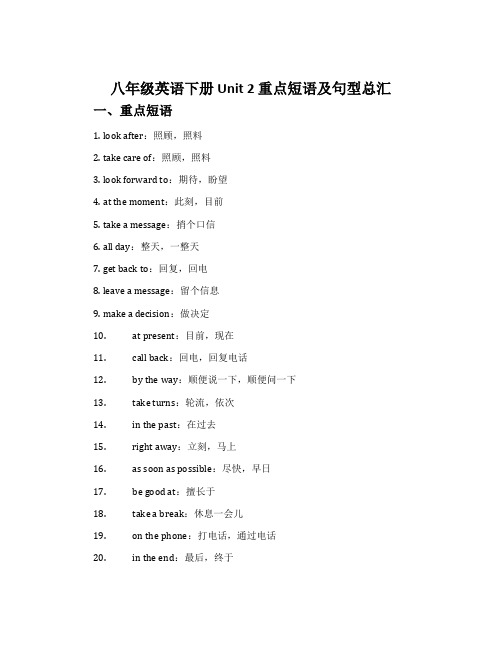
八年级英语下册 Unit 2 重点短语及句型总汇一、重点短语1.look after:照顾,照料2.take care of:照顾,照料3.look forward to:期待,盼望4.at the moment:此刻,目前5.take a message:捎个口信6.all day:整天,一整天7.get back to:回复,回电8.leave a message:留个信息9.make a decision:做决定10.at present:目前,现在11.call back:回电,回复电话12.by the way:顺便说一下,顺便问一下13.take turns:轮流,依次14.in the past:在过去15.right away:立刻,马上16.as soon as possible:尽快,早日17.be good at:擅长于18.take a break:休息一会儿19.on the phone:打电话,通过电话20.in the end:最后,终于二、重点句型1.Can you take care of my dog while I’m away?–当我不在的时候,你能照顾我的狗吗?2.I’m really looking forward to your visit next week.–我真的很期待你下周的访问。
3.Sorry, he’s not available at the moment. Can I take a message?–对不起,他现在不在。
我可以捎个口信吗?4.Please call me back as soon as possible.–请尽快给我回电。
5.By the way, have you made a decision about the school trip?–顺便问一下,你对学校的旅行做了决定吗?6.Let’s take turns to help with the cleaning.–我们轮流来帮忙打扫吧。
八年级英语下unit2重点知识总结

I will help to clean up the city parks 重点短语1. Clean-Up Day 清洁日2. an old people’s home 养老院3. help out with sth. 帮助解决困难4. used to 曾经……;过去5.. care for 关心;照顾6.the look of joy 快乐的表情7. at the age of 在......岁时8. clean up 打扫(或清除)干净9. cheer up (使)变得更高兴;振雀10. give out 分发;散发11. come up with 想出;提出12. make a plan 制订计划13. make some notices 做些公告牌14. try out 试用;试行15. work for 为…工作;为…. 效力16. put up 建造;举起;张贴17. hand out 分发;散发;发给18. call up 打电话;召集19. put off 推迟;延迟20. for example 比如;例如21. raise money 筹钱;募捐22. take after 与......相像;像23. give away 赠送;捐赠24. fix up 修理;修补;解决25. be similar to 与……相似26. set up 建立;设立27. disabled people 残疾人28. make a difference 影响;有作用29. be able to 能够30. after-school reading program课外阅读项目二、重点句型1. The boy could give out food at the food bank. 这个男孩可以在食品救济站分发食物。
2. Clean-Up Day is only two weeks from now.清洁日离现在仅仅两周的时间。
八年级英语下册Unit2 单元知识点

八年级英语下册Unit 2单元知识点一、重点短语1. go to sp for a/one’s holiday去某地度假2. be on holiday在度假3. have been to sp去过某地(已经回来)4. have gone to sp去了某地(还没回来)5.join sb in doing sth加入某人去做某事6. get ready for sth. 为……做好准备get ready to do sth.准备做某事7.take sth. with sb.随身携带8. place of interest 名胜9. see each other 互相见面10. miss sb. very much 非常想念某人11.have a fantastic/good/nice/wonderful time=have fun=enjoy oneself玩得愉快12. get to sp.=reach sp.=arrive at/in sp. 到达某地(没有目的地只用arrive)13.at the speed of … 以……的速度14. through the ride在行程中15.(动词)hurry to sp/ go to sp in a hurry(名词) 16. such as/for example例如17. later in the afternoon=in the late afternoon下午迟些时候18. the best part of the day 这天最好部分19. run after sb.追赶某人20. can’t stop doing =can’t help doing 禁不住做某事21. Stop to do something停下来去做另一件事Stop doing something停止正在做的……22. be like magic像魔法一样23. a couple of = a pair of 一双;一对24. near/at the end of 将近/在…结束的时候25. in the end=finally 最后26. by the end of到..为止27. during your stay there (名词) 在你待在那期间28.let me have a look at sth.让我看一下某物29.go to sp to attend a meeting去某地开会30.在沙滩上玩play on the sand 31. 顺便说一下by the way 32. 邀请某人去野餐invite sb to go for a picnic33.去野餐go for a picnic /have a picnic 34.中国园林Chinese gardens35.自然景观places of natural beauty36.全年去那儿go there all year round(during the whole year)37.在任何季节in any season 38.在一年的那个时刻at that time of year39.去某地出差go to sp on business 40.leave for sp动身去某地,前往某地42.在一大早in the early morning43.坐飞机去某地take a plane to sp / take a flight to spgo to sp by air / plane go to sp on a plane44.wave to sb.向某人挥手二、词汇梳理1.miss sb. very much 非常想念某人miss v.1)思念;想念When I studied in USA,I miss my parents very much.2)错过,没赶上Hurry up, or you will miss the bus.n. 小姐,后接姓氏时,常常大写This is my English teacher, Miss li.2.spend the whole day at Disneyland在迪斯尼度过一整天spend v 1)度过I spent my winter holiday in Hainan.2) 花费spend + 时间/金钱on + 东西spend + 时间/金钱(in) doing somethingE.g. I spent an hour on my homework yesterday.I spent an hour in doing my homework yesterday.3.On the way 在路上on the way to + 地点在去……的路上on one’s way t o + 地点在某人去……的路上注意:遇到home/here/there 等地点副词时省略to4. see sb. playing on the sand看到某人正在沙滩上玩see somebody doing sth看到某人正在做see somebody do sth看到某人做某事的过程或经常看到某人做某事E.g.I saw him working in the garden yesterday. Jim often sees Mary help others.5.die v 死亡His grandfather died last week.death n 死亡He cried after knowing his grandfather’s death.dying 动词现在分词;形容词奄奄一息的,垂死的His grandfather is dying. 他的爷爷快过世了。
(完整版)八年级英语下册第二单元知识点

Unit 2 I'll help to clean up the city parks一、基本知识点1. sick 生病的,有病的;可在句中作表语Mary could not come because she is sick。
也可作定语a sick child【区别ill】ill与sick同义;但是只在句中做表语,不做定语。
Mary could not come because she is ill.2. cheer (sb.) up(让某人)变得高兴;振奋起来The good news cheered up everyone in our class。
3。
give out分发;散发,相当于hand out,The teacher is giving out/ handing out the test papers.give sth。
out to sb。
意为。
4. volunteer【名词】志愿者【动词】义务做,自愿做(某事)volunteer to do sth. ,The girls could volunteer in an after—school study program.5。
used to do sth。
过去/曾经(常)做某事,表示过去的习惯、动作或状态,并强调现在已经不再存在或发生。
There used to be a cinema here.They told me stories about the past and how things used to be.6. alone【形容词】独自一人的,无感情色彩:The musician enjoyed living alone and writing songs himself。
lonely (感到)孤独寂寞的,带有很强的感情色彩,可做表语或定语。
The lonely boy is not lonely now.7. care for sb./sth.照顾;照料……care【名词】小心,关心take care of=look after →【动词】care about sb./sth。
(完整版)人教版八年级英语下册第二单元知识点归纳总结.doc

Unit 2 I’ll help to clean the city parks短语归纳1.clean up 打扫干净2.cheer up (使)变得更高兴;振奋起来3.give out 分发4. used to 曾经......;过去........5.give away 赠送;捐赠6.set up 建立;设立7.make a difference有作为e up with 想出9.put off 推迟10.put up 张贴11.call up 打电话给12.help out 帮助.....摆脱困难13.care for 照顾;照看14.give up 放弃15.try out for 参加选拔e true 实现17.run out of 用光18.take after 与.....相像19.fix up 修理20.be similiar to 与......相似用法归纳1.need to do sth 需要做某事2.make plan to do sth 制定计划做某事3.ask sb (not ) to do sth 要求某人(不要)做某事ed to do sth 过去常常做某事5.decide to do sth 决定做某事6.help sb (to)do sth 帮助某人做某事7.make a difference to 对......产生影响8.make it possible for sb to do sth 使得做某事对某人来说是可能的拓展链接动词+副词短语cheer up 使高兴起来clean up 打扫干净put up 张贴mix up 修理give away 赠送give out 分发give up 放弃use up用光get up 起床hand in 上交put off 推迟pick up 捡起think over 仔细思考turn down 关小音量set up 建立set off 出发look out 小心动词+介词短语look after 照顾belong to 属于take after 与....相像hear from 收到.....来信hear of 听说pay for 支付wait for 等待动词+副词+介词短语get out of 避免come up with 想出catch up with 追上赶上look forward to 期待盼望go on with 继续动词+名词短语have a rest 休息一下take a walk 散步make mistakes 犯错have a try 试一下take place 发生tell a lie 撒谎make a decision 做决定动词+名词+介词短语have a look at 看一看make a friend with 与.....交朋友pay attention to 注意make fun of 取笑Be+形容词+介词短语be late for 迟到be angry with 生气be fond of 喜欢be good at 擅长be good for 对...有好处be short of 缺乏be similiar to 与......相似be strict with 对......严格要求be pound of 骄傲自豪语法点动词不定式归纳只跟动词不定式做宾语的动词决心学会有希望(decide,learn,wish,hope)同意计划莫假装(agree,plan,pretend)忘记拒绝会失望(forget,refuse,fail)准备设法来帮忙(prepare,try,manage,help)提供请求负担起(offer,beg,afford)记得阻止理应当(remember stop,be supposed)习题链接1.-Tom failed the exam again-Sorry to hear that. We should do something to .A.cheer him upB.cheer on himC.cheer him onD.cheer uo him2.The boys volunteer three hours up the park near their school.A.cleaningB. to cleanC. cleanedD. with cleaning3.The woman in red a teacher.She works in a hospital now.ed to beB. is used to beC.was used to beD.is4.The old man lives ,but he doesn’t feel .A.alone;aloneB. lonely;lonelyC.lonely;aloneD. alone;lonely5.Tina, I have something important you.A.tellingB.tellsC.tellD.to tell6.--The old man all his money to a charity.A.took awayB.put awayC.went awayD.gave away7.We all feel after hear of the news.A.excited;excitingB.exciting;excitingC.excited;excitingD.exciting;excited。
英语八年级下册unti2知识点
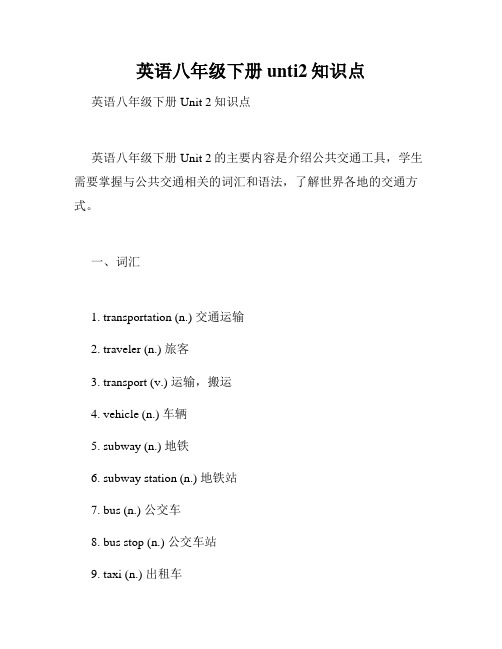
英语八年级下册unti2知识点英语八年级下册Unit 2知识点英语八年级下册Unit 2的主要内容是介绍公共交通工具,学生需要掌握与公共交通相关的词汇和语法,了解世界各地的交通方式。
一、词汇1. transportation (n.) 交通运输2. traveler (n.) 旅客3. transport (v.) 运输,搬运4. vehicle (n.) 车辆5. subway (n.) 地铁6. subway station (n.) 地铁站7. bus (n.) 公交车8. bus stop (n.) 公交车站9. taxi (n.) 出租车10. bridge (n.) 桥11. intersection (n.) 十字路口12. pedestrian (n.) 行人13. traffic light (n.) 交通灯14. highway (n.) 高速公路15. tram (n.) 有轨电车二、语法1. 现在进行时现在进行时用来描述正在进行的动作或状态,结构为 be + 动词+ ing,例如:I am taking the subway to work. 我正在坐地铁去上班。
They are walking to the bus stop. 他们正在步行去公交车站。
2. 一般现在时一般现在时用来描述经常性或习惯性的动作或状态,结构为主语+动词原形,例如:She usually takes the bus to school. 她通常乘公交车去上学。
The traffic light turns red. 交通灯变为红色。
3. 介词 in 和 on 的用法in 用来表示在某个范围之内,例如在一年中的某个月份、某个季节等,例如:I usually travel in the summer. 我通常在夏天旅行。
He studies in the library. 他在图书馆学习。
on 用来表示在某个表面上,例如在地图、日历、时间上,例如:She marked the date on the calendar. 她在日历上标记了日期。
人教版八年级下册英语第二单元知识点

人教版八年级下册英语第二单元知识点Unit 2 I’ll help to clean up the city parks.一、重点短语1.Clean-Up Day清洁日2.an old people’s home养老院3.help out with sth.帮助解决困难ed to曾经……过去5.care for关心;照顾6.the look of joy快乐的表情7.at the age of在……岁时8.cleanup打扫(或清除)干净9.cheer up(使)变得更高兴10.give out分发;散发e up with想出;提出12.make a plan制订计划13.make some notices做些公告牌14.try out试用;试行15.work for为……工作;为……效力16.put up建造;举起;张贴17.hand out分发;散发;发给18.call up打电话;召集19.put off推迟;延迟20.for example比如;例如21.raise money筹钱;募捐22.take after与……相像;像23.give away赠送;捐赠24.fix up修理;修补;解决25.be similar to与……相似26.set up建立27.disabled people残疾人28.make a difference影响;有作用29.after-school reading program课外阅读项目30.be able to能够二、知识点解析1.hope todo sth.希望做某事,含hopeto do sth.的句子可以转换为宾语从句。
eg:Ihope to pass the exam.=I hope that I can pass the exam.2.“动词+up”的短语结:clean up打扫干净cut up切碎growup长大set up熬夜setup建立,设立stay up熬夜wake up醒来,叫醒take up占用giveup放弃use up用完cheerup使振作起来,使高兴起来(代词必须放中间)put up搭建,张贴end up最终成为,最后处于make up组成,例题:Manyvolunteers will help to__________the city parks next parks next Friday.A.give up B.pick up C.clean up3.give out:发出,放出(热,光等)The sun gives out lightand heat to the earth用完,耗尽We had just reached home whenthe petrol gave out.公布,发表The news of the event wasgiven out over the radio.4.give的短语:give away捐赠,赠给give up放弃give off发出,放出give sb.sth.=give sth.to sb.给某人某物give in让步,屈服give back归还5.put offdoing sth.推迟做某事e.g.:We can’t put off making a plan. 常见的put短语:put on穿上,戴上put out熄灭,扑灭put up搭起,升起,张贴put up with容忍put away收起来例题:They heardthe party was__________because of the exam.e up with提出,想出(答案,计划等)例题:He__________manyideas to solve these problem already.ed to变否定句或疑问句时常借助助动词did.8.care的派生词:careful小心的carefully小心地careless粗心的carelessly粗心地care的短语:care for照顾,喜欢careabout关心,在意take care小心takecare of照顾,照料9.such+a/an+形容词+名词=so+形容词+a/an+名词“如此”注意:当名词前有many,much,few,little修饰时,要用so,而不用such.例题:We had___________awful weather_________we couldn’t finish the work on time.A.so,thatB.such,that C.such an,that10.-ing是名词后缀。
八下英语第二单元笔记

八下英语第二单元笔记以下是八下英语第二单元的笔记,希望对您有所帮助。
一、重点单词1. vacation n. 假期2. exciting adj. 令人兴奋的3. disagree v. 不同意4. agree v. 同意5. rent v. 租用6. beach n. 海滩7. because conj. 因为8. headache n. 头痛9. cough n. 咳嗽10. fever n. 发烧二、重点短语1. stay at home 待在家里2. go to the mountains 去山上3. go to the beach 去海滩4. visit museums 参观博物馆5. go to the movies 看电影6. stay in bed 卧床休息7. have a good time 过得开心8. feel like doing sth 想做某事9. go for a walk 去散步10. practice doing sth 练习做某事三、重点句子1. I want to go somewhere interesting. 我想去有趣的地方。
2. We’re planning to go to New York for vacation. 我们计划去纽约度假。
3. She would rather stay at home than go out in the rain. 她宁愿待在家里也不愿出去淋雨。
4. He is considering renting a car. 他正在考虑租一辆车。
5. I hope to have a restful vacation this year. 我希望今年能度过一个轻松的假期。
八年级下册英语第二单元知识点梳理

八年级下册英语第二单元知识点梳理一、单词- ability:能力- advantage:优势- appreciate:欣赏- article:文章- attitude:态度- behavior:行为- celebration:庆祝- childhood:童年- concentrate:专心- confident:自信的- connect:连接- conversation:对话- cooperation:合作- decision:决定- discover:发现- distance:距离- energy:能量- experience:经验- experiment:实验- expression:表达- festival:节日- friendship:友谊- fun:有趣的- helpful:有帮助的- human:人类的- individual:个体- language:语言- mood:心情- nervous:紧张的- notice:注意- particular:特定的- personal:个人的- pleasure:快乐- population:人口- positive:积极的- professional:专业的- purpose:目的- quality:品质- relationship:关系- responsibility:责任- rule:规则- science:科学- sense:感觉- situation:情况- social:社会的- strength:力量- successful:成功的- task:任务- teacher:教师- tool:工具- total:总的- translation:翻译- understand:理解- universal:普遍的- valuable:有价值的- weak:薄弱的- weight:重量二、短语- be able to:能够- be born:出生- be connected to:与...相连- be in a good mood:心情好- be interested in:对...感兴趣- be nervous about:对...感到紧张- be responsible for:对...负责- be successful in:在...方面取得成功- break down:故障- get along with:与...相处- get better at:在...方面变得更好- give up:放弃- go through:经历- make a decision:做决定- make mistakes:犯错- take a break:休息三、句子模板- I am interested in learning English.- He was born in China.- She is responsible for organizing the event.- They are getting better at playing the piano.- The teacher gave us a break after the test.- It's important to make decisions based on careful consideration. - The experiment showed positive results.四、语法知识点- 形容词比较级的构成及用法- can 和 could 的用法区别- 现在进行时的构成及用法- 一般过去时的构成及用法- 反意疑问句的构成及用法- 介词短语的使用五、文化知识点- 中国的传统节日春节- 中国民间艺术的代表之一京剧- 良好的礼仪惯在中国文化中的重要性- 英国著名的庆祝节日万圣节以上是八年级下册英语第二单元的知识点梳理,希望对您有帮助!。
- 1、下载文档前请自行甄别文档内容的完整性,平台不提供额外的编辑、内容补充、找答案等附加服务。
- 2、"仅部分预览"的文档,不可在线预览部分如存在完整性等问题,可反馈申请退款(可完整预览的文档不适用该条件!)。
- 3、如文档侵犯您的权益,请联系客服反馈,我们会尽快为您处理(人工客服工作时间:9:00-18:30)。
Unit 2 I’ll help to clean up the city parks一、基本知识点1. sick 生病的,有病的;可在句中作表语Mary could not come because she is sick.也可作定语a sick child【区别ill】ill与sick同义;但是只在句中做表语,不做定语。
Mary could not come because she is ill.2. cheer (sb.) up(让某人)变得高兴;振奋起来The good news cheered up everyone in our class.3. give out分发;散发,相当于hand out,The teacher is giving out/ handing out the test papers.give sth. out to sb. 意为。
4. volunteer【名词】志愿者【动词】义务做,自愿做(某事)volunteer to do sth. ,The girls could volunteer in an after-school study program.5. used to do sth.过去/曾经(常)做某事,表示过去的习惯、动作或状态,并强调现在已经不再存在或发生。
There used to be a cinema here.They told me stories about the past and how things used to be.6. alone【形容词】独自一人的,无感情色彩:The musician enjoyed living alone and writing songs himself. lonely(感到)孤独寂寞的,带有很强的感情色彩,可做表语或定语。
The lonely boy is not lonely now.7. care for sb./sth.照顾;照料……care【名词】小心,关心take care of=look after →【动词】care about sb./sth.关心,在意某人/事→【形容词】careful / careless →【副词】carefully8. such“这样的,这种,如此”,用于修饰名词such+ a/ an+形容词+单数名词:such a good day /such an exciting matchsuch+形容词+复数名词/不可数名词:such important decisions such delicious food如果名词前被many, much, few, little修饰时,只能用so,而不用such:so many sick children/ so little time9. try out for…参加…选拔,争取成为…Thirty football players tried out for the Best Player of the year.try out试用,试验10. journey【名词】(尤指长途)旅行,行程;trip【名词】多指短途旅行;travel【名词、动词】travel around the world →【名词】traveler旅行者11.【复习】be busy with sth. be busy doing sth.12.【复习】try doing sth. try to do sth. try one’s best (to do sth.)13.【复习】be worried about sb./ sth. = worry about sb./ sth.14. raise money集资,筹钱;raise money for…为……筹钱raise【动词】举起;提高;募集15. keep【动词】keep+名词,保留(某物);keep+形容词,保持16.【形容词】broken破损的,出毛病的;blind瞎的,失明的;deaf聋的;disabled有残疾的,丧失能力的在句中做定语和表语:17. make it possible (for sb.) to do sth.使(某人)做某事成为可能,You helped to make it possible for me to have Lucky.make it +形容词(+for sb.) to do sth. 使(某人)做某事成为…;think/find it +形容词to do sth.18. make a difference to…对……有影响;对……有作用,difference前可以用no, any, some, much等修饰,如The rain made no difference to the game. Hard-working makes much difference to study.19. difficulty【可数/不可数】表示抽象意义的“困难”时为不可数;表示具体的“难题、难事”时为可数;have difficulty (in) doing sth.= have trouble (in) doing sth.20. train【动词】训练,trained为过去分词,可做定语,意为“受过训练的”a trained dog21. be excited about sth. ,Everyone is excited about the good news.【复习】excited意为,在句中做;exciting意为,在句中做。
22. order【名词】命令,指示;顺序,次序【动词】订购;点(菜)follow the order ,。
23. change【动词】变化,改变It’s hard for a person to change his life(style). 【名词】变化;零钱change A for B用A换成B:When you travel in China, remember to change US dollars for RMB.24. repair 【动词】修理,修补;fix【动词】安装;使固定【fix up修理=repair】二、重要单词、短语1. several2.satisfaction3. understand4. imagine5. train Give短语小结1. give up (doing)2. give out3. give away4. give in Up短语小结1. give up2. clean up3. cheer up4. fix up5. set up6. put up7. get up8. stay up (late)9. come up with10.take up (doing sth.)Out短语小结1. give out2. hand out3. try out4. go out5. eat out6. hang out7. find out8. get out of9. come out三、重点语法——动词不定式A. 作主语——为避免句子的头重脚轻,常用it作为形式主语,而真正的主语动词不定式后置。
常用句型:It +be+adj./n.+(for/of sb.) to do sth./It takes sb. some time to do sth.B. 作宾语——动词want, decide, hope, ask, agree, choose, learn, plan, need, teach, prepare…常接动词不定式作宾语。
C. 作(后置)定语——常用于“have/has+sth.+to do”或“enough+名+to do”“It’s time to do sth.”等结构中。
D. 作宾语补足语——tell, ask, want, invite, teach, like, call等可接带to的动词不定式作宾语补足语,构成tell/ask/want /call/invite sb. to do sth.结构。
【注意】动词不定式作使役动词和感官动词的宾语补足语时应省去to:“一感(feel),二听(listen to, hear),三让(let, make, have,,四看(look at, see, watch, notice),半帮助(help)”。
E. 动词不定式作状语主要用来修饰动词,表示目的,结果或原因。
为了强调目的,有时可以把动词不定式放在句首,或在不定式前加in order (to) 或so as (to) “为了,目的是”。
常用结构有too + adj./adv. + to do sth.等。
F. 固定句式中动词不定式的用法常见的有:had better (not) do sth./Would you like to do sth.?/Why not do sth.?/Would you please (not) do sth.?等。
专项训练题一、选择适当答案。
1. _______ is difficult to work out the maths problem. A. This B. That C. It D. Its2. We decided _______ at the end of this month. A. travel B. not start out C. to leave D. going3. They have no paper_______. A. to write B. to write with C. write on D .to write on4. Let him _______ a rest. I think he must be tired after the long walk. A. has B. have C. to have5. _______the computer is a problem. A. How to use B. What to use C. Where to use D. Which to use6. The teacher told us _______in bed. A. don’t read B. read not C. to not read D. not to read7. The old man was _______angry _______ say a word. A. so, that B. as, as C. too, to D. very, to8. Why _______home tomorrow? A. not go B. not going C. not to go D. didn’t go9. The TV set is too loud. Will you please _______? A. turn down it B. turn it down C. to turn it down10. It’s cold outside. You had better _______ your coat. A. to put on B. putting on C. puts on D. put on二、用所给动词的正确形式填空。
